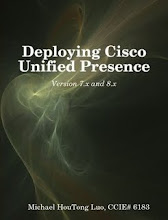Cisco CUCM (CallManager) has "urgent priority" option for translation patterns and route patterns. At the first glance, it is pretty straight forward. It is usually used with emergency patterns like "911". The purpose is to eliminate potential inter-digit timeout. For instance, when user dialed 911, CUCM will route the call immediately, even if there are potential matches (like 911XXX).
But what happens if we use urgent priority on variable length pattern (like "!")? Since wildcard ! means "one or more digits", shouldn't the system wait for more digit anyway? Would interdigit timeout happen or not?
The short answer is "No". If you have urgent priority on pattern "!", and you are dialing digit by digit, the system will start routing the call after the first digit is pressed. Because that matches the definition "one or more digits". That seems pretty useless. Why would people do that?
It is not totally useless. You may still dial multiple digits with the following options:
Option 1: Bloc-Dial
Keep the phone on hook (do not get a dial tone), enter all the digits you want, then hit the "Dial" button. This is called bloc-dial. You may pass all digits to ! pattern with urgent priority with bloc-dial.
Option 2: From previous hop
In large-scale dial plan design, we usually expose translation patterns(TPs) to phones, but not route patterns(RPs). The intend is to use TPs to do all kinds of digit manipulation and class of control. Then pass the manipulated digits to RPs. In this case, TP has no problem passing all digits to RP (even if the RP has urgent priority).
Let say, you have a two-tier dial plan design (TP/RP). You have emergency TPs with urgent priority. When those TPs pass digits to RPs, it may or may not experience interdigit timeout depending on your RP setup. Interdigit timeout is evaluated at each hop. If you use RP ! to catch all digits passed by TPs, you might want to enable urgent priority on that ! pattern. Or as an alternative, you may enable "Do Not Wait for Interdigit Timeout On Subsequent Hops" on the TP.
- 7XXX
- 700XX
When you dial 7, 0, 0, 1, 2 digit-by-digit, which one will be matched? At the first glance, 700XX seems to be the best candidate because it matches more digits. Enable urgent priority on 7XXX seems harmless for this dialing string, right? Actually not. When urgent priority is enabled on 7XXX, you won't be able to enter the fifth digit. Once you entered the 4th digit, system immediately routes the calls. The only way to work around that is to use bloc-dialing.
In summary:
- Interdigit timeout applies to digit-by-digit dialing. It does not apply to bloc-dialing.
- Digits passed by previous hop does NOT equal to bloc-dialing. For instance, urgent priority on TP level does not necessarily immune to interdigit timeout at RP level.
- Be careful of overlapped patterns. Using urgent priority might have side effects.



No comments:
Post a Comment